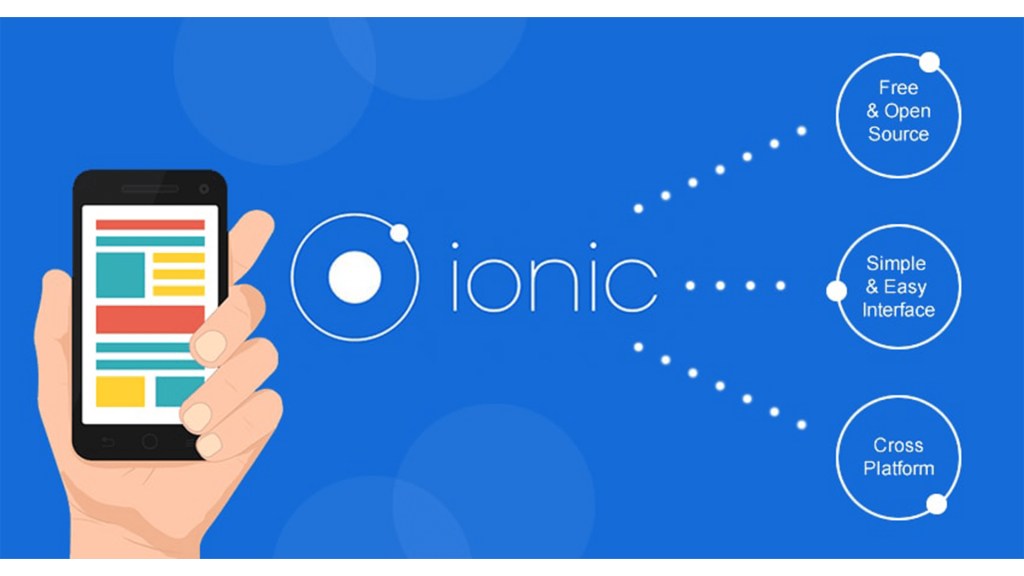Since its release in 2013, the Ionic platform has gained huge respect in the hybrid and mobile development community.
As of January 2019, Ionic has a git repo of 39.9k stars with an active support community. Its open-source mobile app development framework helps to build top-quality native and progressive applications.
Before we dig into details, let’s first look at the three main features of the Ionic framework.
- OSS Framework: Ionic provides open-source, free mobile UI toolkit for building cross-platform apps (iOS, Android, and web) from a single codebase.
- Mobile DevOps: It addresses the complete lifecycle of mobile DevOps with automated native builds, live-updates, and CI/CD.
- AngularJS: It uses the AngularJS frontend Javascript framework for building scalable applications.
- Integrations: Ionic allows integrating community plugins along with premium supported integrations.
- Compiler: It uses Capacitor, Cordova, and PhoneGap compiler for native mobile applications with CSS, HTML, and Javascript.
- App Builder: Through Ionic Studio, it provides a visual development environment to build functional apps in minutes.
Packed with lots of useful & out-of-box CSS components, the Ionic platform provides extensive documentation, examples, and starter videos. It helps to simplify the learning curve and get developers up and running quickly.

Advantages of Ionic Platform
Ionic is an open-source SDK for hybrid mobile app development. It wraps the AngularJS framework with HTML5 and CSS and uses Cordova to access native device functions. The biggest advantage of using Ionic is — it allows building hybrid apps with amazing UI, which behave like native apps and rely on a single shared codebase.
If you’re scared of Javascript, then trust me, with Ionic it’s not as bad as you might think. Look at these advantages of the Ionic platform.
- Cross platform: The code you write once runs effectively on web, iOS, and android.
- Open source: It’s free to use with a number of community generated plugins integration.
- Development environment: Majority of components are developed in HTML, CSS, and JS, which almost all web developers are familiar with.
- Frontend development: AngularJS is embedded in Ionic by default allowing to build scalable applications.
- Deeplinking: To load a specific page on the app through a web link.
- Live Reload: It helps developers to compile and redeploy apps at every stage of development.
The Ionic platform provides a set of Angular directives (custom HTML elements) for its components. This makes using widgets as easy as writing a line of HTML code. Plus, the developers get access to Angular’s touch recognizers, view animation logic, HTML sanitation, and asynchronous communication.
While the developers can use Ionic straight after cloning or unpacking the library zip, they can also install their Node.js-based CLI through NPM and start quickly with their seed project.
Also read – Trending JavaScript Frameworks in 2020
What’s New in Ionic
Ionic React
On October 14, 2019, Ionic released Ionic React — a native react version of the Ionic framework. Using the standard react-dom library, Ionic has successfully expanded its ecosystem around the web platform.
With developers’ growing intent towards progressive web apps, Ionic’s integration with React provides one of the best PWA solutions to generate highly efficient web components.
Read the details about the Ionic React announcement here.
Capacitor
Addressing many developers’ concerns about Cordova’s performance, Ionic released Capacitor 1.0 on May 22, 2019. Ionic still supports Cordova. However, new apps will run on this new cross-platform engine — Capacitor, which majorly aims at supporting progressive web apps.
The capacitor is available as a Javascript API and developers can import it directly to their apps. Also, exposing new native SDKs to Capacitor is extremely easy! Developers will need just a little wrapper code with first-class support for Swift on iOS and Java on Android.
Read more about how the Capacitor is different from Cordova here.
Ionic Studio
Ionic Studio is an IDE (Integrated Development Environment) for an amazing developer experience for building Ionic apps. It offers a robust code editor with TypeScript support, auto compilation, and debugging.
It brings forth a visual development environment with AWS Amplify for backend integrations. Ionic Studio also eliminates the need for developer docs.
Ionic Framework Use Case
Recently, Mantra Labs has built a mobile application using Ionic for its client — Ezetap. The app generates an invoice for merchants and takes payment against it. It helps the merchants manage their purchase records, accounts, and customer data. The app is currently used by leading businesses like Dominos, Indian Oil, Deccan Herald, Indane, and many more.
Ionic Platform Installation Guide
For installation help and smart suggestions from developers, you may refer to the Ionic Documentation.
Please note, the platform is the actual hardware/software on which an application or software is built. Whereas, a framework is a collection of libraries and classes that provide a structure for app development. Ionic is thus, both a platform and a framework for building web and mobile applications.
If you’re planning for mobile app development or have queries related to the Ionic framework, feel free to reach out to us at hello@mantralabsglobal.com. Our developers are here to clear doubts and offer suggestions based on your business and technical needs.
[Related: Learn Ionic Framework From Scratch in Less Than 15 Minutes!]
Knowledge thats worth delivered in your inbox




